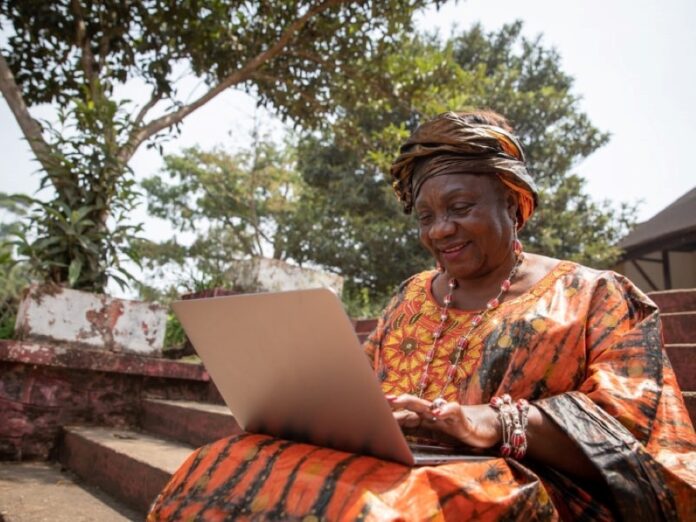A recent article by Girollet, D. (2023) titled “Digital divides among microenterprises: Evidence from sub-Saharan Africa” published in Journal of International Development, shows that digital inequalities are rooted in the vertical heterogeneity of informal sectors as well as in pre-existing socio-economic inequalities.
“
The study reveals digital inequalities in sub-Saharan Africa’s informal sectors, shaped by vertical heterogeneity and pre-existing socio-economic disparities among firms. – Girollet, D. 2023
This article explores the disparities in digital usage within the informal sectors of African economies, investigating whether the uneven adoption of digital technologies is intertwined with existing socio-economic inequalities. The research draws upon data from the After Access business surveys, conducted by Research ICT Africa from 2017 to 2018, encompassing 3,300 firms and entrepreneurs across eight sub-Saharan African countries. The study categorizes informal firms into three groups—top performers, constrained gazelles, and survivalists—based on their economic performance and characteristics. The study reveals those digital inequalities stem from vertical heterogeneity within informal sectors, with specific firm characteristics significantly influencing the professional use of digital technologies. Additionally, the study identifies both shared and segment-specific strategies to address digital disparities among informal firms.
How the Study was Conducted
The author employed data from the After Access business surveys conducted by Research ICT Africa (RIA) in 2017-2018 across eight sub-Saharan African countries: Senegal, Ghana, Nigeria, Rwanda, Kenya, Tanzania, Mozambique, and South Africa. The author focused on non-farm informal enterprises and excluded some observations because of missing values on key variables. The final sample comprised 3,300 firms from eight countries. The author segmented the sample of informal enterprises into three groups based on their size, net profit, and predicted probability of being a top performer: top performers, constrained gazelles, and survivalists. The author employed descriptive, multivariate, and decomposition analyses to identify the main determinants of digital technologies usage for business purposes and explain the usage gaps between segments.
What the Authors Found
The author found that digital inequalities are rooted in the vertical heterogeneity of informal sectors as well as in pre-existing socio-economic inequalities. The author identified three segments of informal firms in sub-Saharan Africa based on their size and performance: top performers, constrained gazelles, and survivalists. The author found significant gaps in access and usage of digital technologies across segments, with top performers being more likely to use digital technologies for business purposes than constrained gazelles and survivalists.
Why is this important?
The study suggests that digital transformation can be a source of both opportunities and challenges for informal firms in sub-Saharan Africa, depending on their segment and characteristics. The study highlights the need for policy interventions to address the digital inequalities among informal firms, taking into account their heterogeneity and specific constraints. The study provides empirical evidence on the determinants of digital technologies usage for business purposes, which can help design more effective and targeted policies to foster digital inclusion and productivity of informal firms. The study contributes to the literature on digital divides and informal sectors in sub-Saharan Africa, by adopting a multidimensional and relational approach to digital inequalities and by identifying three segments of informal firms based on their performance and potential.
What the Authors Recommend
The authors recommend the following actions to address digital inequalities among informal firms in sub-Saharan Africa:
- Promoting financial inclusion: The author argues that Access to bank accounts and formal financial services can facilitate the adoption and use of digital technologies, especially mobile money and online banking, by reducing the cost and increasing the convenience of transactions.
- Improving access to electricity and ICT infrastructure: The author proposes that reliable and affordable access to electricity and internet connectivity can enable informal firms to use a wider range of digital technologies and functions, such as computers and management software, that can enhance their productivity and performance.
- Supporting digital skills development: The study argues that providing training and awareness programs on the potential benefits and uses of digital technologies can help informal entrepreneurs overcome the lack of knowledge and capabilities that limit their digital inclusion.
- Addressing gender digital divide: Empowering women entrepreneurs through targeted interventions, such as gender-sensitive policies, subsidies, and mentorship, can reduce the gender gap in the access and use of digital technologies and foster greater economic inclusion and empowerment of women.
In conclusion, Girollet’s study sheds light on the intricate dynamics of digital inequalities within the informal sectors of sub-Saharan Africa. The research underscores the pivotal role played by vertical heterogeneity and pre-existing socio-economic disparities in shaping the digital landscape for microenterprises. By categorizing informal firms into distinct segments and employing rigorous analytical methods, the study unravels the nuances of digital technology adoption and usage. The findings emphasize the imperative for targeted policy interventions, advocating for financial inclusion, improved infrastructure, digital skills development, and gender-sensitive measures. As the digital transformation journey unfolds for informal firms in the region, understanding and addressing these disparities will be crucial for fostering inclusive growth, harnessing opportunities, and mitigating challenges on the path to digital empowerment.
















 The African Research (AR) Index is a comprehensive scholarly directory and database focused explicitly on journal publishers that publish and disseminate African research.
The African Research (AR) Index is a comprehensive scholarly directory and database focused explicitly on journal publishers that publish and disseminate African research.

